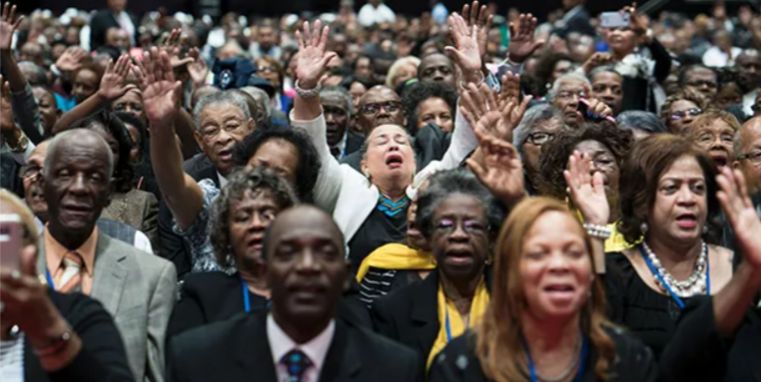(ThyBlackMan.com) The killing of conservative activist Charlie Kirk has reignited one of the ugliest and most divisive feuds within the American right. For years, Kirk, the bombastic founder of Turning Point USA, represented the polished, mainstream, youth-driven face of Republican activism. His slick campus tours, Instagram-ready soundbites, and well-funded machine of influencers were designed to make conservatism look modern, dynamic, and inclusive. But lurking in the shadows was a rival faction, one that rejected Kirk’s approach as watered-down, compromised, and weak. That faction calls itself the Groyper Army, a movement organized around white nationalist streamer Nick Fuentes. And in the days since Kirk’s assassination, many eyes have turned toward Fuentes and his followers, not because they have been implicated directly but because they embody the radicalized energy that has long targeted Kirk as a symbol of the conservative establishment’s limits.

To understand why the killing of Charlie Kirk has inflamed speculation about Groypers, it is necessary to revisit the origins of the movement. The word “Groyper” comes from a variation of the Pepe the Frog meme, a cartoon frog with chubby cheeks resting its hands smugly on a table. The meme was co-opted by Fuentes’ followers around 2019 as a mascot representing a new generation of far-right activists. Unlike earlier iterations of the alt-right, who reveled in shock value and overt fascist imagery, Groypers presented themselves as pious, conservative, and “traditional.” They championed Christianity, family values, and nationalism while smuggling antisemitism, racism, and homophobia into their rhetoric. They asked questions about immigration meant to push the Overton window toward mass deportation and demographic fearmongering. They railed against “globalist elites,” always thinly veiled code for Jews. They positioned themselves as defenders of an America under attack from liberalism, multiculturalism, and moral decline. For disaffected young white men looking for belonging, Fuentes offered community and a leader who told them their frustrations were justified.
The Groyper Army entered public consciousness during what came to be called the “Groyper Wars” in late 2019. Nick Fuentes and his supporters began showing up at Turning Point USA events on college campuses, where Kirk and his surrogates were attempting to brand conservatism as youthful and diverse. At event after event, Groypers stood up to ask hostile questions: Why does Turning Point support immigration policies that still allow demographic change? Why does Kirk defend homosexuality or transgender rights within conservatism? Why does Turning Point employ speakers who support Israel? Why isn’t Kirk more faithful to Donald Trump’s hardline agenda? These questions were designed not just to embarrass Kirk but to present him as a sellout, a gatekeeper standing between young conservatives and a truer, harder-edged ideology. The confrontations went viral, and suddenly Kirk — who had built his brand on being combative with liberals — found himself under siege from his own right flank. It was a battle over the soul of conservatism, one that revealed just how fractured the movement had become.
Kirk fought back, labeling Fuentes and his followers extremists who had no place in a movement that should be open to all Americans regardless of race or sexuality. He warned that the Groypers were bigots cloaked in the language of Christian values. But Fuentes and his army thrived on that backlash. Being called extremists only validated their self-image as truth-tellers. Every denunciation from Kirk or mainstream Republicans became proof of conspiracy: that the establishment wanted to silence them because they were “too real.” This dynamic — of mainstream figures calling them dangerous, and Groypers claiming victimhood — became the formula that sustained the movement in the years to come.
Nick Fuentes himself has always been at the center. Born in 1998, Fuentes grew up in Illinois and first gained attention as a far-right commentator on YouTube. By his early twenties, he was livestreaming to thousands, building a persona equal parts firebrand preacher and edgy internet troll. He called his brand “America First,” an echo of the isolationist slogan from the 1940s, and positioned himself as the authentic heir to Trumpism. Where Trump wavered, Fuentes claimed he would not. Where conservatives compromised, he declared he would stand firm. He was banned from mainstream platforms for violating hate speech rules but migrated to alternative streaming services, where his reach continued. By 2020, Fuentes was not only leading the Groyper Army but appearing on the radar of federal investigators. His presence at the January 6th Capitol riot and his subsequent interviews with House committees cemented his reputation as a radical willing to cross lines.
Critics say Fuentes is dangerous precisely because of his ability to speak the language of youthful rebellion. He is not the image of an old, bitter white nationalist waving a Confederate flag. He is a slick, internet-savvy figure who jokes, memes, and preaches to disaffected young men who spend their lives online. He makes racism sound like common sense, antisemitism like skepticism of elites, and misogyny like a defense of traditional families. In doing so, he launders extremist ideology through a cultural vernacular that resonates with Generation Z. Young men who feel alienated from campus culture, who resent feminism or diversity, or who are looking for belonging in an atomized society can find in Fuentes not only a leader but a peer. This makes him not just an ideologue but a recruiter.
That recruitment pipeline has worried watchdogs for years, but federal authorities have taken a cautious approach. The FBI has monitored Fuentes, but there has been no decisive crackdown, largely because much of what Fuentes does remains within the realm of protected speech. He couches his rhetoric in jokes, parodies, and disclaimers. He rarely gives direct orders, instead nudging his followers toward conclusions. This plausible deniability allows him to maintain influence without crossing into overt incitement. But critics argue this distinction is academic: the effect of his rhetoric is radicalization, whether or not he literally says “go commit violence.” The assassination of Kirk has made that concern painfully real. Even if Fuentes or his movement had nothing to do with the act, their years of demonizing Kirk as a sellout created a toxic climate in which violence seemed possible.
Fuentes’ response to Kirk’s killing followed a familiar script. Publicly, he expressed devastation, insisting the violence must stop and calling for America to turn back to Christ. But almost immediately, he pivoted to grievance: accusing the Trump administration of not doing enough, demanding transparency about the suspect’s online activity, and framing the assassination as part of a larger war on conservatives. This is classic Fuentes: outward sympathy coupled with a deeper narrative of victimhood and betrayal. It ensures that even in moments of national mourning, he remains the center of conversation and reinforces his brand as the uncompromising truth-teller.
Donald Trump’s relationship to Fuentes has been a constant source of controversy. Trump has never publicly condemned Fuentes. In fact, when Fuentes dined with Trump and Kanye West at Mar-a-Lago in 2022, the former president shrugged it off as an accident, saying he didn’t know who Fuentes was. Yet Fuentes had been one of the most visible figures in American extremism for years by then. Trump’s refusal to disavow reflects both political calculation and his own blind spots. On the one hand, Trump knows the Groypers represent an energized, online army that can amplify his message across social media platforms. On the other, Trump has always been reluctant to alienate any faction of his base, no matter how extreme. That silence, however, has consequences. By not condemning Fuentes, Trump normalizes his presence within the conservative ecosystem. And when a figure as powerful as Trump refuses to draw boundaries, it sends a signal to young conservatives that Fuentes’ extremism is not beyond the pale.
What makes Fuentes bad for America is not only his message but his method. He thrives on polarization, on convincing people that they must choose between weakness and radicalism, between being a “cuckservative” or a “real American.” He corrodes the middle ground and poisons the possibility of coalition politics. He narrows conservatism into a toxic brew of exclusion and hate, alienating women, minorities, and anyone who doesn’t fit his narrow vision of America. He tells young Americans that the future is not about building bridges but about building walls — literal and metaphorical. He insists that strength comes not from civic engagement but from cultural war. That is a recipe for endless division and a democracy perpetually at war with itself.
Social media has erupted since Kirk’s assassination, reflecting these divisions. On Twitter, one user wrote, “Charlie Kirk was hated by the Groypers more than by the left. If anyone thinks this wasn’t influenced by Fuentes’ poison, they’re lying to themselves.” Another chimed in, “The right eats its own. First they turned on McCain, then Romney, then Kirk. Who’s next?” On Threads, a different tone emerged: “Notice how quickly officials blamed Antifa. Now whispers about Groypers. Maybe the truth is both sides radicalize and America is just broken.” Others pushed Trump to act: “Say Nick Fuentes is toxic. Just say it. That’s all it takes. Why won’t you?” The cacophony online mirrors the political fracture in real life — a country so divided that even in tragedy, the narratives become weapons.
The assassination of Charlie Kirk may ultimately be remembered as a moment of reckoning for the conservative movement. If the right cannot distance itself from its extremist factions, it risks being defined by them. If Trump continues to give oxygen to figures like Fuentes, the GOP risks alienating a generation of voters who will see the party as synonymous with hate. And if young Americans continue to be radicalized by movements like the Groypers, the country risks a future where the next generation’s political imagination is shaped less by hope and more by grievance. America’s experiment in democracy has always depended on boundaries — lines between vigorous debate and dangerous extremism. Fuentes’ Groyper Army thrives on erasing those boundaries. That is why he is bad not just for conservatives but for the country as a whole.
At 25 years old, Nick Fuentes has already managed to inject his ideology into the bloodstream of American politics. He represents not just a fringe but a symptom: of disillusioned youth, of unchecked online radicalization, and of a political culture too timid to confront its own extremists. The assassination of Charlie Kirk is a tragedy that demands answers. But beyond the investigation into the suspect, America must also grapple with the larger climate of radicalization that made such violence conceivable. And that climate cannot be understood without reckoning with Nick Fuentes and the Groyper movement. Whether the FBI chooses to act, whether Trump chooses to speak, and whether young conservatives choose to resist the pull of extremism will determine not just the future of the right but the trajectory of the nation itself.

















This article and the single response-comment is not correct, IMO.
Antifa influences , the Furry freakshow lifestyle and the deranged trans ideology is most likely responsible for Kirk’s murder/assassination. Trantifa is a subset of Antifa now, and for the last few years. I am just now looking into Fuentes, but most of the left – run online world is not characterizing him accurately either. Typical propaganda.
This article effectively exposes the dangerous influence of figures like Fuentes within conservatism, highlighting the movements fragmentation and Trumps complicity. The portrayal of Kirks assassination as a consequence of this radicalization is chillingly relevant.